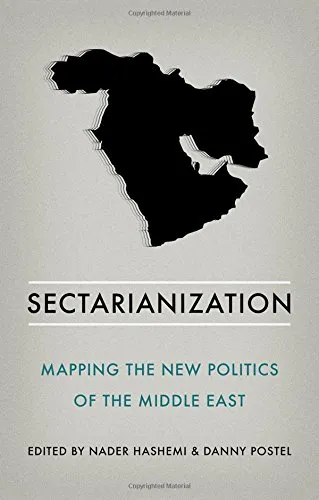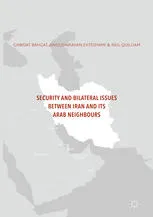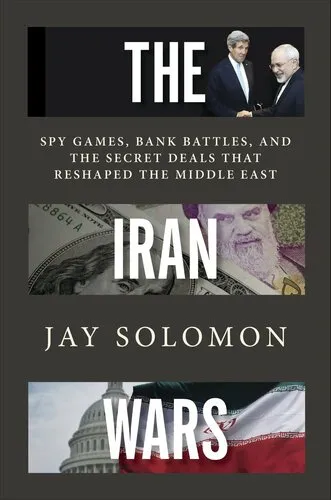Sectarianization : mapping the new politics of the Middle East
4.5
بر اساس نظر کاربران

شما میتونید سوالاتتون در باره کتاب رو از هوش مصنوعیش بعد از ورود بپرسید
هر دانلود یا پرسش از هوش مصنوعی 2 امتیاز لازم دارد، برای بدست آوردن امتیاز رایگان، به صفحه ی راهنمای امتیازات سر بزنید و یک سری کار ارزشمند انجام بدینکتاب های مرتبط:
معرفی کتاب "Sectarianization: Mapping the New Politics of the Middle East"
کتاب Sectarianization: Mapping the New Politics of the Middle East یکی از آثار برجسته و ارزشمند در زمینه تحلیل علمی و جامع از پدیده تکثیر و تشدید شکافهای فرقهای در خاورمیانه است. این کتاب، به سردبیری Nader Hashemi و Danny Postel، به بررسی عوامل اصلی پدیده فرقهایسازی پرداخته و نشان میدهد که چگونه سیاست و نه مذهب، نقش کلیدی در بروز و تقویت این بحرانها ایفا کرده است.
خلاصهای جامع از موضوعات کتاب
"Sectarianization" به دنبال آن است تا مرز میان فهم سنتی از اختلافات مذهبی و حقایق سیاسی را بیابد. در حالی که بسیاری از تحلیلهای رایج، بحرانهای خاورمیانه را به اختلافات تاریخی میان گروههای مذهبی نسبت میدهند، این کتاب تبیین میکند که شکافهای فرقهای بیش از آنکه ریشه در مذهب داشته باشند، ناشی از برداشتهای سیاسی، اجتماعی و اقتصادی هستند.
این کتاب از منظر چندین نویسنده و پژوهشگر متنوع، موضوعات مختلفی از جمله جنگ داخلی سوریه، سیاست خارجی عربستان سعودی، و گسترش نقش ایران را بررسی میکند. آنچه مهم است این است که در تمام تحلیلهای آن، sectarianization نه به عنوان یک داده تاریخی غیرقابل تغییر، بلکه به صورت یک پروژه سیاسی هدفمند بررسی میشود.
هر فصل از کتاب به یکی از کشورهای خاورمیانه و تأثیرات فرقهایسازی در آن میپردازد. نویسندگان تلاش کردهاند تا به ریشههای تاریخی و جدید این پدیده بپردازند و چشماندازی روشن در مورد چگونگی پایان دادن به این روند ارائه دهند.
نکات کلیدی که از کتاب میآموزیم
- فرقهایسازی محصول سیاستهای سرکوبگرانه حکمرانان است، نه ریشههای بنیادین مذهبی.
- رسانهها و دولتها نقش مهمی در شکلدهی به روایتهای فرقهای دارند.
- حل چالشهای فرقهای نیازمند بازنگری در سیاستهای ملی و بینالمللی است.
- درک بحرانهای فرقهای بدون در نظر گرفتن نابرابریهای اقتصادی و اجتماعی ناقص است.
جملات مهم از کتاب
"Sectarianization has less to do with religion and more to do with authoritarianism - a mask for political failure."
"The myth that the Middle East sectarian divides are primordial invalidates the reality of modern political engineering."
چرا این کتاب مهم است؟
اهمیت کتاب Sectarianization در این است که چارچوبی جدید و بدیع برای درک بحرانهای خاورمیانه فراهم میکند. در جهانی که رسانهها و سیاستمداران اغلب تلاش میکنند نزاعهای خاورمیانه را به شکافهای مذهبی و ایدئولوژیک تقلیل دهند، این کتاب افشا میکند که این بحرانها در واقع بیارتباط با عملکرد دولتهای استبدادی و نیروهای خارجی نیستند.
این اثر همچنین به سیاستمداران، محققان دانشگاهی و فعالان اجتماعی کمک میکند تا بهتر بفهمند که چگونه با کاهش قدرت نیروهای فرقهای و ایجاد سیاستهای عادلانهتر، میتوان تنشهای منطقهای را کاهش داد.
بنابراین، Sectarianization نه تنها برای کسانی که به تاریخ و سیاست خاورمیانه علاقهمند هستند، بلکه برای هر کسی که به دنبال درک ابعاد عمیقتر سیاست و اجتماع در دوران مدرن است، ضروری است.
Introduction
The Middle East has long been a region that captivates the world's attention, often seen through the lens of sectarian conflict and religious divisions. However, these widespread perceptions offer a misleading and reductive understanding of the complex dynamics at play. Sectarianization: Mapping the New Politics of the Middle East delves deep into the roots of contemporary conflicts within the region. Co-authored by Nader Hashemi and Danny Postel, this work challenges the overly simplistic narrative that sectarian tensions stem solely from ancient religious hatreds. Instead, it unveils the manipulation of sectarian identities by authoritarian states, local political elites, and external powers as a strategy for maintaining control amid sweeping societal changes.
Published at a time when the Middle East continues to witness seismic political and social shifts, Sectarianization provides an alternative framework to better comprehend the dynamics driving the region's conflicts. This book offers a critical, timely, and nuanced analysis of how sectarianism is not an inevitable reality but rather the result of political processes aimed at deflecting accountability and consolidating power. Grounded in historical context and featuring diverse viewpoints from scholars and intellectuals, it explores the intersection of geopolitics, authoritarianism, and grassroots movements in shaping contemporary sectarian tensions.
Detailed Summary of the Book
In Sectarianization, Hashemi and Postel dismantle the popular myth that the Middle East's conflicts are a natural outcome of sectarian divides. Instead, they argue that sectarianism is a modern political construct, heavily influenced by the actions of authoritarian regimes, political elites, and foreign powers. Through a collection of essays by leading experts in the field, the authors illustrate how these actors deliberately exploit sectarian identities to maintain their grip on power, delegitimize opposition, and deflect demands for political reform.
This book incorporates case studies from Syria, Iraq, Yemen, Bahrain, and Saudi Arabia, alongside broader reflections on the roles of Iran and Western powers in exacerbating sectarian divides. It demonstrates how social upheavals like the Arab Spring, far from being defined by religious rifts, were initially rooted in democratic aspirations. However, the transformative potential of such movements was systematically sabotaged by regimes that weaponized sectarian rhetoric to fragment popular resistance. In doing so, Hashemi and Postel reject the dominant narrative of entrenched religious conflict and instead emphasize the political and economic dimensions of sectarianization.
Key Takeaways
- Sectarianism in the Middle East is not ancient or inevitable; it is a political tool used by elites to preserve power.
- The Arab Spring was a turning point, exposing how grassroots demands for reform could be sabotaged by sectarian rhetoric.
- Authoritarian regimes and external actors have weaponized sectarian identities to silence dissent and retain control.
- Sectarian identities, while real, do not inherently lead to violence—political manipulation turns these differences into fault lines.
- A nuanced understanding of geopolitics, authoritarianism, and social movements is essential to grasp current Middle Eastern dynamics.
Famous Quotes from the Book
“Sectarianism is not a reflection of ancient hatreds; it is an instrument used in modern times by certain actors seeking political benefit.”
“The Arab Spring revealed the potential for unity across sectarian lines, but this unity threatened entrenched systems of power.”
“To talk about the Middle East as naturally sectarian is not only misleading but dangerously simplistic—it masks the real drivers of conflict.”
Why This Book Matters
Sectarianization: Mapping the New Politics of the Middle East stands out for its bold and compelling argument: that sectarianism is not a historical inevitability but a political process, deeply intertwined with struggles for power. By shifting the focus away from cultural determinism and religious essentialism, the authors provide a more hopeful and actionable framework for understanding the Middle East's conflicts. The book stresses the importance of addressing the root causes—authoritarianism, bad governance, and foreign intervention—rather than perpetuating fatalistic narratives. In doing so, it calls for a rethinking of how the West and other global actors engage with the Middle East, emphasizing the importance of supporting democratic movements and resisting sectarian exploitation. For scholars, policymakers, and anyone interested in the region, this book is essential reading for dismantling superficial narratives and fostering a deeper understanding of complex political realities.
دانلود رایگان مستقیم
شما میتونید سوالاتتون در باره کتاب رو از هوش مصنوعیش بعد از ورود بپرسید
دسترسی به کتابها از طریق پلتفرمهای قانونی و کتابخانههای عمومی نه تنها از حقوق نویسندگان و ناشران حمایت میکند، بلکه به پایداری فرهنگ کتابخوانی نیز کمک میرساند. پیش از دانلود، لحظهای به بررسی این گزینهها فکر کنید.
این کتاب رو در پلتفرم های دیگه ببینید
WorldCat به شما کمک میکنه تا کتاب ها رو در کتابخانه های سراسر دنیا پیدا کنید
امتیازها، نظرات تخصصی و صحبت ها درباره کتاب را در Goodreads ببینید
کتابهای کمیاب یا دست دوم را در AbeBooks پیدا کنید و بخرید
1584
بازدید4.5
امتیاز0
نظر98%
رضایتنظرات:
4.5
بر اساس 0 نظر کاربران
Questions & Answers
Ask questions about this book or help others by answering
No questions yet. Be the first to ask!














